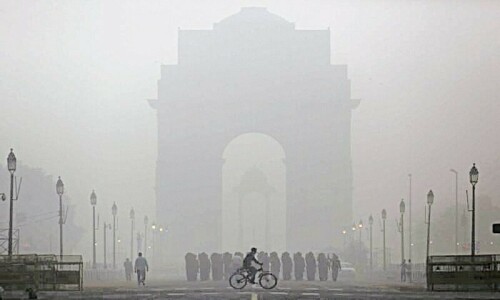THE digital age has obviously thrown up a range of new challenges regarding security and privacy. The distinction between public and private lives grows increasingly blurred, and the opportunities to link up or cross-reference information about people also expand.
It’s old hat now for employers to turn to Google as the most basic port of call when hiring or firing. Many people routinely run searches on themselves from time to time, just to be aware of the context in which they appear on the Web.
With arguably keener interest and certainly more power, governments too turn to Google while monitoring the online lives of persons or, as it may be, material of interest.
Last week, Google released its Transparency Report, and the data indicates that such surveillance by governments has been rising since the search engine started the process of releasing a biannual report in 2009.
In the first six months of this year, governments around the world made nearly 21,000 requests for access to Google’s data.
While it’s not unexpected that the United States made the most number of demands for details of online activity — 7,969 times in the period under review — it would seem curious that Turkey made the most requests to have content removed. Until you remember that it is also high on the list of countries in the habit of jailing journalists who do not follow the prescribed line. (For the record, however, 148 of 501 of these requests related to Ataturk, the current government and national identity.)
Asking for details of users or their activity and requesting content to be removed are two different things. While the former can represent governments nursing suspicions about certain individuals, or reference to security matters, the latter usually refers to online matter that comes in conflict with the country’s laws or, less frequently, is considered unacceptable for other reasons.
Turkey has laws about defaming public figures, while Brazil does not allow parodies of candidates at election-time. Germany regularly asks Google to remove neo-Nazi content.
Which brings us to the matter of YouTube, still out in the cold as far as Pakistan is concerned. I have resigned myself to life without Pathanay Khan, at least till I can find the CD, but even so, enough is really enough.
On Thursday, the chairman of the Pakistan Telecommunications Authority (PTA), Farooq Awan, said that it may be restored in another three weeks’ time.
That’s all very well, but can he please explain why it was blocked in the first place? Yes, I remember the film and the furore. But demonstrably, Google can take material down or remove a country’s access if asked to do so.
Complaints can refer to compliance with local laws, or other reasons to plead for removal such as hate speech, pornography or copyright. Even in the case of that film, access to its trailer (which was all that was available) was restricted upon request by Google in five countries, including India and Indonesia. The citizens of these countries continued to make use of other material on YouTube.
Why did the same not happen in Pakistan’s case? I remember the appeals made by various public representatives, and it seemed then that Google remained unmoved (though five other countries managed to persuade it).
Was the required procedure followed? Why did we lose the entire site? Pakistan has very definite laws regarding blasphemous material, after all. If Google can remove or restrict access to content, complying with the laws of other countries, why did Pakistan not manage to induce it to do the same? The answer could lie in the state’s sins of omission. Google does not remove content simply on being asked to do so, (or, one would assume, public outcry about it).
In the period under review, for example, as listed in the Transparency Report, it complied with fewer than half of the removal requests pertaining to France and Germany. For the UK, the figure is 64 per cent of the requests and for the US it is 90 per cent.
When deciding whether or not it will remove or restrict access to content, Google has set out its own criteria: the request must be specific, relate to a specific web address and must have come from a relevant authority.
The BBC’s report on the topic cites an example from the UK: “Google received a request from police to remove 14 search results that linked to sites allegedly criticising the police and claiming individuals were involved in obscuring crimes. It did not remove the content.”
In Pakistan’s case, the Supreme Court ordered that all links to the “offending material” be blocked on YouTube or any other website; and shortly afterwards, on Sept 17, Prime Minister Raja Pervez Ashraf sent out the order which resulted in the PTA imposing a blanket shutdown on the entire site.
Explanations by the government and the PTA are in order. Was the removal request ever made formally to Google? At the time it was assumed so, but never was any proof — such as the text of the letter of complaint — offered.
Did the request go out from the relevant authority, which one assumes would be the PTA? And, it is quite possible that given that Pakistan was talking generally about all links to that film and any other potentially blasphemous material, which would logically include comments or discussions on this or related subjects, it did not fit into Google’s requirements regarding specificity.
Certainly, I am speculating here; so along with restoring access to YouTube, the state owes us an explanation accompanied not by the usual rhetoric but by proof.
Oh, and next time some idiot puts something on the Web that contravenes local laws, can the administration please get its reaction right?
The writer is a member of staff. hajrahmumtaz@gmail.com











































